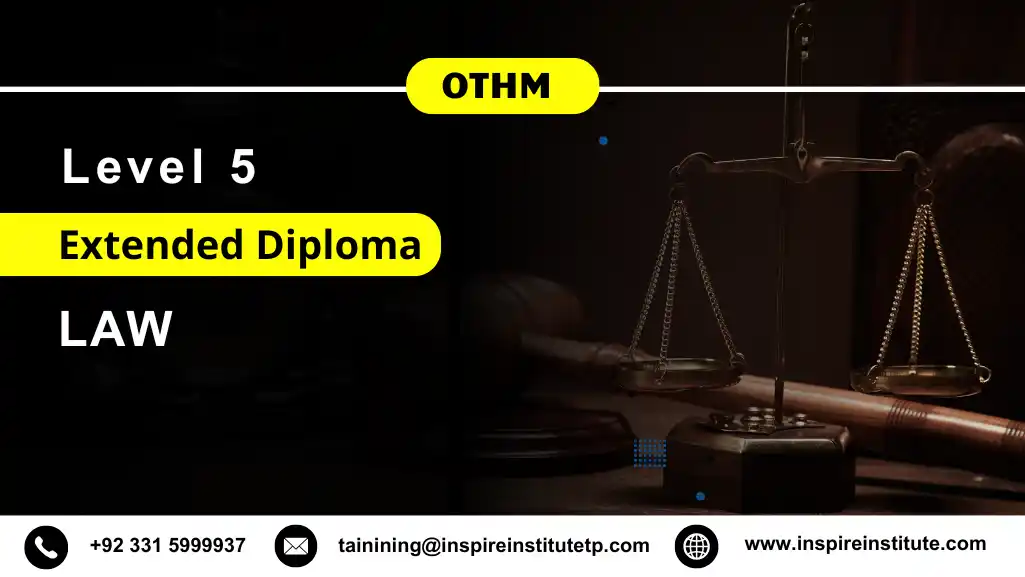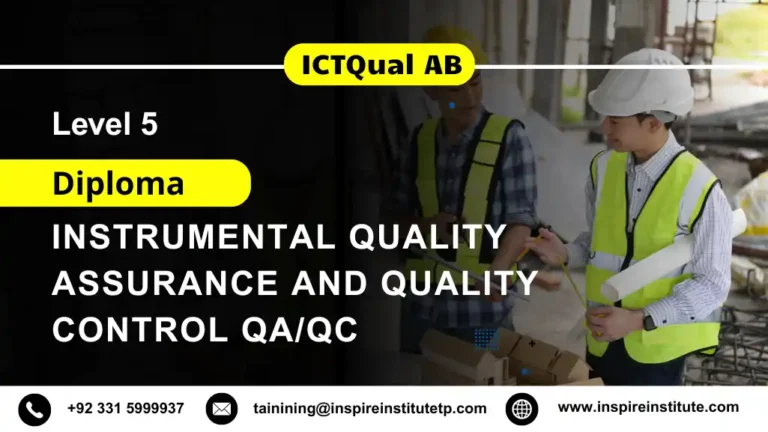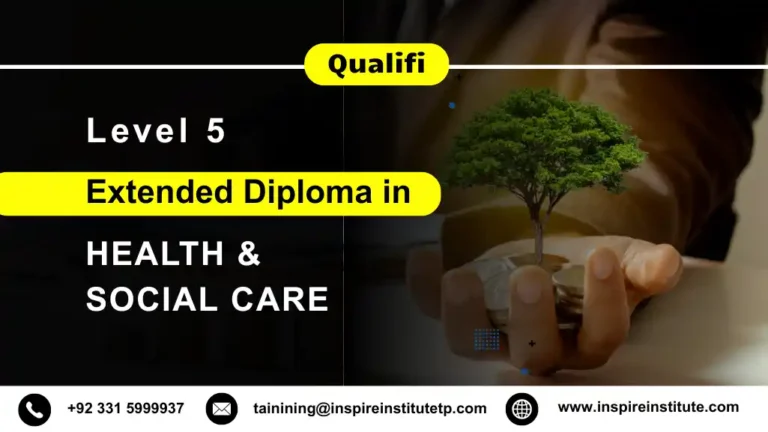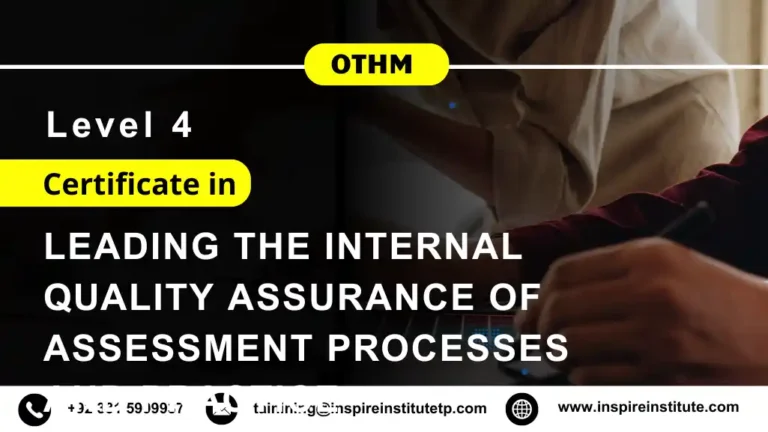OTHM Level 5 Extended Diploma in Law
The OTHM Level 5 Extended Diploma in Law is a comprehensive, UK-accredited qualification designed to deepen learners’ understanding of core legal principles and practices. Covering key areas such as contract law, criminal law, company law, and legal systems, this diploma is equivalent to the second year of a bachelor’s degree. It equips learners with both academic knowledge and practical skills, making it an ideal pathway for those aiming to pursue a legal career or progress to higher education in law or related fields.
Why Choose this Qualification
The OTHM Level 5 Extended Diploma in Law offers a range of benefits for those looking to advance their legal knowledge and career. Here’s why this qualification stands out:
- Accredited and Recognized: The qualification is accredited by Ofqual and recognized by universities and employers worldwide, providing you with a credible foundation for your legal career.
- Comprehensive Legal Knowledge: It covers a wide range of legal topics, including contract law, criminal law, legal systems, and company law, giving you a solid understanding of both theoretical and practical legal frameworks.
- Pathway to Higher Education: Upon completion, you can progress to a final-year law degree or pursue further study at Level 6, opening doors to a variety of legal professions.
- Career Advancement: Ideal for individuals aspiring to work in law firms, government agencies, or corporate legal departments, the diploma enhances your employability by developing essential legal skills.
- Flexible Learning Options: With flexible study modes (full-time, part-time, and online), this qualification is suited for both fresh students and working professionals looking to further their education.
- Practical and Academic Skills: It prepares you for real-world legal challenges while also developing academic research and analytical skills necessary for advanced legal studies.
Choose the OTHM Level 5 Extended Diploma in Law to gain a strong legal foundation and take the next step in your career or education.
Course Overview
Ofqual Regulated Qualification
Course Level: 5 Extended
Average Completion Time:
6-24 Months
Study Units: 12 Units
Evidence & Assignment Based
Qualification Structure
The OTHM Level 5 Extended Diploma in Law consists of twelve mandatory units, totaling 240 credits and 2400 hours of Total Qualification Time (TQT). The recommended minimum Guided Learning Hours (GLH) for this qualification is 960 hours.
To earn the OTHM Level 5 Extended Diploma in Law, learners must accumulate 240 credits, with 120 credits earned at Level 4 (6 units) and 120 credits at Level 5 (6 units).
Level 4: 6 Mandatory units
Level 5: 6 Mandatory units
Who Should Take This Course
The OTHM Level 5 Extended Diploma in Law is designed for individuals who are passionate about pursuing a career in the legal field or furthering their legal education. This course is ideal for:
- Aspiring Legal Professionals: Those who aim to build a career in law, whether in legal practice, corporate law, government, or the non-profit sector.
- Recent School Leavers or Graduates: Students who have completed Level 3 or equivalent qualifications and wish to progress into higher legal studies.
- Working Professionals: Individuals currently employed in legal or administrative roles who want to enhance their legal knowledge and qualifications.
- Career Changers: Those from other industries looking to transition into the legal field with a recognized and structured pathway.
- University Progression Seekers: Learners aiming to advance to the final year of an LLB or other law-related undergraduate programs.
Whether you’re just starting your legal journey or looking to advance your existing skills, OTHM Level 5 Extended Diploma in Law provides a strong foundation and a clear path forward in the world of law.
Course Benefits
The OTHM Level 5 Extended Diploma in Law offers a range of valuable benefits for learners aiming to develop their legal knowledge and advance their careers in the legal field. Key advantages of this qualification include:
- Globally Recognized Qualification
Accredited by Ofqual (UK), this diploma is respected by universities and employers around the world, making it a strong foundation for academic or professional growth. - Comprehensive Legal Curriculum
The course covers essential areas of law such as criminal law, contract law, company law, and legal systems, providing a well-rounded understanding of both theory and practice. - Progression to Higher Education
Successful learners can progress to the final year of an undergraduate degree (such as LLB) or pursue Level 6 qualifications, making it an excellent pathway to further legal studies. - Career Opportunities in Law
The OTHM Level 5 Extended Diploma in Law equips learners with the knowledge and skills needed for roles in legal firms, corporate legal departments, government agencies, and more. - Development of Transferable Skills
Gain critical thinking, legal analysis, problem-solving, and research skills that are highly valued in the legal industry and beyond. - Flexible Learning Options
Available through various approved centers, this qualification may be offered in classroom, online, or blended formats—ideal for both full-time students and working professionals. - Affordable and Efficient
Offers an efficient route to gaining a higher-level legal qualification without the immediate need for a full university degree, making it cost-effective and time-saving.
OTHM Level 5 Extended Diploma in Law is an excellent choice for anyone looking to build a solid legal foundation, advance academically, or enhance their career in law or related fields.
Eligibility Criteria
To enroll in the OTHM Level 5 Extended Diploma in Law, learners must meet the following entry requirements:
Age
Applicants must be 18 years of age or older at the time of enrollment.
Experience
While prior legal or professional experience is not mandatory, mature learners with relevant work background may be considered based on their experience and ability to complete the qualification.
Educational Background
A recognized Level 3 qualification (such as A-Levels, BTEC, or equivalent) is typically required.
Learners who have completed a Level 4 qualification may be eligible for direct entry into the Level 5 units.
Equivalent overseas qualifications may also be accepted, subject to approval by the center.
English Language Competency
For learners whose first language is not English, proof of language proficiency is required. This can be demonstrated through:
An IELTS score of 5.5 (or equivalent), or
Successful completion of an English-medium qualification, or
Other acceptable forms of English language assessment approved by the training center.
All applicants will be assessed to ensure they are suitable for the course and able to benefit from the learning experience.
The Qualification Process
Here is a step-by-step guide to help you understand the entire journey from pre-registration to certification:
- Self-Assessment:
Begin by evaluating your eligibility for the course. Ensure you meet the entry requirements, such as relevant qualifications or professional experience, as outlined for the program. - Registration:
Complete your registration by submitting the required documents, including a scanned copy of a valid ID, and pay the necessary registration fee. This is your first official step in the qualification process. - Induction:
An assessor will conduct an induction session to verify your eligibility and introduce you to the evidence requirements. During this stage:- If the assessor finds that you meet all the necessary criteria, you will proceed to the next step.
- If you do not meet the entry requirements, your registration will be canceled, and your fee will be refunded.
- Evidence Submission:
Based on the assessment criteria, you will need to submit evidence demonstrating your knowledge and competence. Consult with your assessor if you need clarification on the type and nature of the evidence required. This evidence could include assignments, projects, case studies, or professional experiences related to sustainability management. - Feedback and Revision:
The assessor will review your submitted evidence and provide feedback. Evidence that meets the required criteria will be marked as “criteria met.” If there are any gaps, the assessor will highlight them, and you will need to address those gaps by revising and resubmitting the evidence. - Competence Evidence:
Submit your final evidence demonstrating that you have successfully achieved all the learning outcomes. The assessor will mark your submission as “Criteria met” once everything is up to standard. - Internal Quality Assurance (IQA):
After your evidence is approved by the assessor, the Internal Quality Assurance Verifier (IQA) will review it to ensure that the assessment was carried out consistently and according to OTHM standards. - External Verification:
The IQA then presents your portfolio to OTHM External Quality Assurance Verifiers (EQA) for final confirmation. The EQA may contact you directly to verify the authenticity of your evidence. - Certification:
Once all internal and external checks are completed to satisfaction, OTHM will issue your official certificate, confirming that you have successfully achieved the qualification.
This comprehensive process ensures that learners demonstrate all necessary competencies and meet the high standards required for the OTHM Level 5 Extended Diploma in Law







